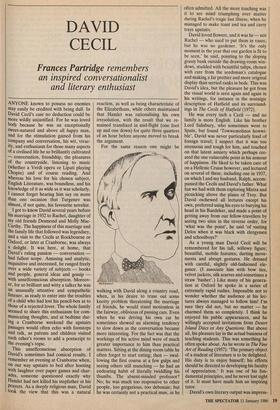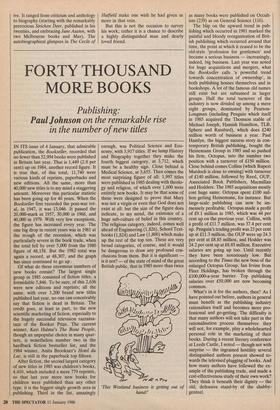DAVID CECIL
Frances Partridge remembers
an inspired conversationalist and literary enthusiast
ANYONE known to possess no enemies may easily be credited with being dull. In David Cecil's case no deduction could be more wildly unjustified. For he was loved both because he was an exceptionally sweet-natured and above all happy man, and for the stimulation gained from his company and conversation, his wit, vivac- ity, and enthusiasm for those many aspects of a civilised life he so brilliantly cultivated — conversation, friendship, the pleasures of the countryside, listening to music (whether a Verdi opera or Lipati playing Chopin) and of course reading. And Whereas his love for his chosen subject, English Literature, was boundless, and his knowledge of it as wide as it was scholarly, I cannot forget hearing him say on more than one occasion that Turgenev was almost, if not quite, his favourite novelist.
I got to know David several years before his marriage in 1932 to Rachel, daughter of my old friends Desmond and Molly Mac- Carthy. The happiness of this marriage and the family life that followed was legendary, and a visit to the Cecils at Rockbourne or Oxford, or later at Cranbome, was always a delight. It was here, at home, that David's ruling passion — conversation had fullest scope. Amusing and analytic, Inquisitive and interested, he ranged freely over a wide variety of subjects — books and people, general ideas and gossip with unselfconscious absorption. Moreov- er, for so brilliant and witty a talker he was an unusually attentive and sympathetic listener, as ready to enter into the troubles of a child who had lost his pencil-box as to those of a rejected lover. The whole family seemed to share this enthusiasm for com- municating thoughts, and at bedtime dur- ing a Cranbome weekend the upstairs passages would often echo with footsteps and talk, as parents and children visited each other's rooms to add a postscript to the evening's topic.
This unselfconscious absorption of David's sometimes had comical results. I remember an evening at Cranbome when, on our way upstairs to bed after hooting With laughter over paper games and char- ades, someone questioned exactly why Hamlet had not killed his stepfather at his prayers. As a deeply religious man, David took the view that this was a natural reaction, as well as being characteristic of the Elizabethans, while others maintained that Hamlet was rationalising his own irresolution, with the result that we re- mained transfixed in mid-flight (one foot up and one down) for quite three quarters of an hour before anyone moved to break the argument.
For the same reason one might be walking with David along a country road, when, in his desire to tease out some knotty problem threatening the marriage of friends, he would stand motionless in the fairway, oblivious of passing cars. Even when he was driving his own car he sometimes showed an alarming tendency to slow down as the conversation became more interesting. For the fact was that the workings of his active mind were of much greater importance to him than practical matters. Sitting at the dining-room table he often forgot to start eating; then — swal- lowing the first course at a few gulps and seeing others still munching — he had an endearing habit of literally twiddling his thumbs. The absent-minded professor? No; he was much too responsive to other people, too gregarious, too debonair; but he was certainly not a practical man, as he often admitted. All the more touching was it to see mind triumphing over matter during Rachel's tragic last illness, when he managed to make toast and tea and carry trays upstairs.
David loved flowers, and it was he — not Rachel — who used to put them in vases; but he was no gardener. 'It's the only moment in the year that our garden is fit to be seen,' he said, pointing to the sloping grassy bank outside the drawing-room win- dows, studded with beautiful tulips, chosen with care from the seedsman's catalogue and making a far prettier and more original display than serried ranks in beds. This was David's idea, but the pleasure he got from the visual world is seen again and again in his writings, for instance in the nostalgic description of Hatfield and its surround- ings in The Cecils of Hatfield (1972).
He was every inch a Cecil — and no family is more English. Like his brother Lord Salisbury, who sometimes went to Spain, but found `Towwemolinos howwi- ble', David was never particularly fond of foreign travel; I suspect that it was too strenuous and tough for him, and touched on that latent anxiety which perhaps cre- ated the one vulnerable point in his armour of happiness. He liked to be taken care of on a Hellenic Cruise however, and lectured on several of these, including one in 1937, on which I and my husband, Ralph, accom- panied the Cecils and David's father. What fun we had with them exploring Mistra and picnicking above the plains of Troy. But David eschewed all lectures except his own, preferred using his eyes to burying his head in his Baedeker, and made a point of getting away from our fellow-travellers by seeing two sites in the reverse order, for `what was the point', he said 'of visiting Delos when it was black with clergymen and schoolboys?'
As a young man David Cecil will be remembered for his tall, willowy figure; beautiful, mobile features; darting move- ments and abrupt gestures. He dressed with careful, slightly old-fashioned ele- gance. (I associate him with bow ties, velvet jackets, silk scarves and sometimes a straw `basher'.) Like many of his genera- tion at Oxford he spoke in a series of extremely rapid rushes. Impossible not to wonder whether the audience at his lec- tures always managed to follow him! I'm sure they did not, but no matter — he charmed them so completely. I think he enjoyed his public appearances, and he willingly accepted invitations from Desert Island Discs or Any Questions. But above all, his pleasure lay in the actual business of teaching students. This was something he often spoke about. As he wrote in The Fine Art of Reading (1957): 'The primary object of a student of literature is to be delighted.
His duty is to enjoy himself; his efforts should be directed to developing his faculty of appreciation.' It was one of his fun- damental principles, and he never lost sight of it. It must have made him an inspiring tutor.
David's own literary output was impress- ive. It ranged from criticism and anthology to biography (starting with the remarkably precocious Stricken Deer, published in his twenties, and embracing Jane Austen, with two Melbourne books and Max). The autobiographical glimpses in The Cecils of Hatfield make one wish he had given us more in that vein.
But this is not the occasion to survey his work; rather it is a chance to describe a highly distinguished man and dearly loved friend.



























































 Previous page
Previous page